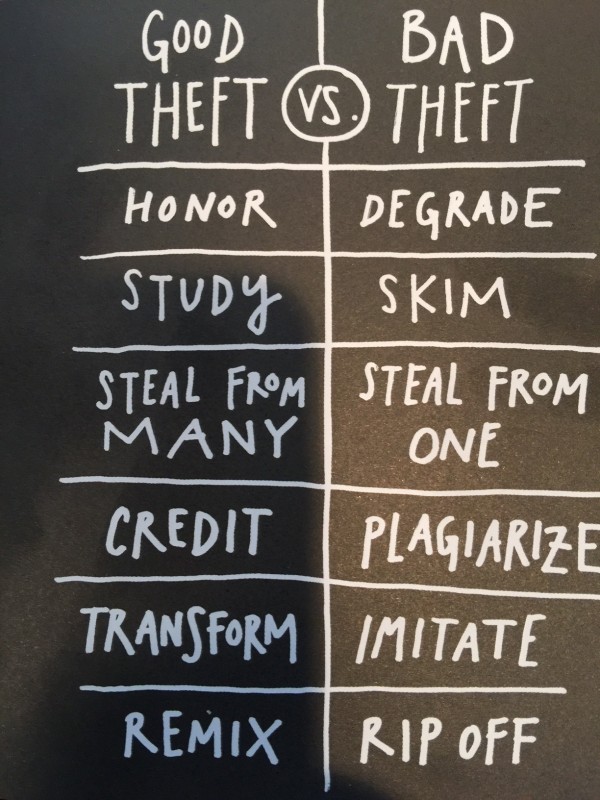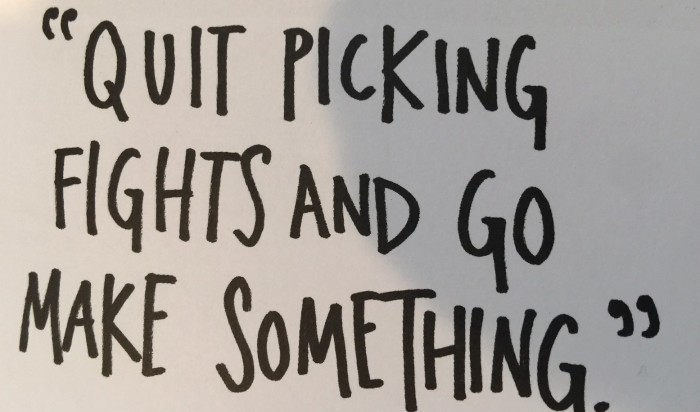
Good & Bad Theft
* In no way is the information presented legal advise or should be taken as such.
For the past couple months I've been thinking about writing a post in regards to trademark, and copyright, plagiarism, and a lot of the other topics related to this that are have just plagued the industry for the past year in one form or another. It seems like not a week goes by that you see somebody talking about how somebody else ripped off their product, their article, their program, their exercise, the name of an article, the name of a book, and it almost gets to the point of being ridiculous because there's really nothing new. You have a lot of people that are claiming that they reinvented the wheel.
There isn't anything new and I think that there's a lot of people that should spend some time just acquainting themselves a little bit with what plagiarism is. It wouldn't behoove the person to actually go and look it up, and see what the actual definition of plagiarism is, and to see what the definition of what a copyright is.
Trademark Laws and Regulations
It doesn't take a whole lot of looking around and research to figure out what's what. One of the things that I've always found very ironic is a lot of people who write articles or blogs that complain about other people stealing their ideas, or stealing their thoughts, if you go and actually look at their articles and their blogs, more times than not, they're stealing somebody else's pictures, which absolutely blows my mind. The photographers have rights, too. They have just as much rights as the person who's authoring the text that's part of the article, but everybody seems to forget these guys and think all they need to do to find a image for their article is to do a google image search.
When I go and I see these people complaining about others who are stealing their text, and then their articles are just fucking plagued with other people's photos, the irony is just un-fucking-believable to me. I've joked with a few photographers now that they should get together and set up a website to where they use their images, then go out and steal everybody else's text, and stick it in their blog. It's really the exact same thing the authors are doing expect instead of steal the photography work - they would be stealing the written work.
I have heard the argument that the authors content takes longer to produce (making it ok to steal the images) and that by using the images of the photographer they are giving them free publicity (I would buy that one if there was an image credit). As for the time it takes to get that one shot used a photographer may have had an entire photo shoot that they had to fly to, all the expenses, and then a whole day of shooting, and then that's where the one image came from, so they have more time and money invested in that one shot, not including the years of training, experience, and equipment it took them to be able to get that really cool image. In contrast it may have taken the author 30 or 40 minutes to write the blog on 'What's the Best Fucking Underwear to Wear When you Squat.' While not really fair to the author here, I'm trying to make a point.
In no way am I saying one is better than the other or one is more important than the other. My point is there are so many people bitching about people stealing their "work" when they are doing the same thing over and over again. In time they will get caught and some of the fines are no joke.
There is a book that I think everybody should read and it's called Steal Like an Artist. It's a very simple read. Anybody can read it, and I took a picture of theft, as far as what's good theft and what's bad theft. As you'll see, if it's bad theft, that means you're completely plagiarizing. You're just taking verbatim, word for word, somebody else's work and it's basically stealing, is what it is, or if it's an image, you're just stealing the image. It's degrading, it's ripping off, imitating, and everything else is on the chart. That's bad. That's what you don't want to do.
This is what I rarely see when I see people complaining about being ripped off. This is rarely the case. Sometimes it is. Over the past year I've seen it three or four times and the people that do this are fucking scumbags. There's absolutely no excuse for it at all and they always have one, but there is no fucking excuse. They're scumbags. They know it and everybody else knows it. No matter how they try to get around it, they're fucking scumbags because anybody who publishes something, and it's made aware, and usually they will be made aware pretty quickly, that what they published is stealing from somebody else. Whoever published it, or whatever site published it, will have that taken down within minutes if they have any ethics at all.
In the 21 years that we've been in business and over 1m pages of content and close to 15K articles, we've had this happen two times. Since then, we've learned how to better search for the article to make sure that it's not somebody else's work and I'll tell you, the two times this did happen, you would shit if I told you the names of the authors that actually did it, because it's typically never a no-name author, but as soon as we were made aware, it was taken down with a public apology and emails sent out to all parties. When I say there's no fucking excuse, there's no fucking excuse. You rip somebody off and plagiarize, it's absolutely disgraceful and there's no excuse at all. As you can tell this does upset me just the same as it does so many others - but - what I am talking about is word for word stealing of someone ease's work. A concept or idea is fair game as long as you have your own spin on it because the odds are the concept and idea wasn't created by the person you or everyone else thinks did.
Good theft, on the other hand, is when you honor the author, or you honor the creator, you study it, you try to figure out where they're coming from, what the philosophy is that they're doing, why are they doing it. It's not just reading an article and then just basically stealing it. You're trying to figure out why they wrote it, what was the purpose behind it and then when you do, if you want to use the word steal, you're stealing from many. If you are good at your craft you will be following many others who are also good at their craft as well as looking at the work of those who came before.
If you're going to write an article on the five ways to better manage your time, you're not going to go to somebody's article that has 10 ways to manage time and then steal verbatim five of the 10 ways. You're going to go and you're going to read 15, 20, 30 different articles and you may take one way from each one of the articles, and that one you do use, you really, really agree with, and you really think it's beneficial, and then you put why you agree with it, and you put your spin on it. If it's something that's really unique and something that you haven't seen before, then you're going to give credit to the person who wrote it.
Giving the credit for that, it doesn't degrade your intelligence in any way whatsoever, it actually increases it because it makes it known that you're following what other people in the industry are doing and that you actually put some thought in what you actually wrote. The good stealing is that you're going to transform what's out there, the same way that is on this list in the image that I posted. You're going to mash it up, man. You're going to remix it, you're going to make it your own (so to say). It's going to become a part of your own training philosophy, so when it comes to training, say it's a training program, you may review 10-15 different training programs, and then you're going through, and you really like this part of this person's program, and this part of this person's program, and you got 10-15 different programs, and you're going to mash it up, then you put it all together. Then you use it and it works really well for you, then that's good stealing. It's your training program. You mashed it up, you put it all together, you tested it, you made sure that it works.
This is how most good programs come around today. A lifter or coach spends years trying stuff that has been used and tried by others. They take what works for them and discard what doesn't, they apply this to others they train and keep what works and discard what doesn't. Ten - Fifteen years later they have something that is really just a mashed up version of many other peoples work. In many cases they would have to cite 50-100 peoples if they felt the need to. When you listen to good coaches speak about their training you will hear them say they took this part from "name" and this part from "name" and so on. Again, very little is new and just reinforces why one should always continue to better their education.
As a side note. Things get really cool when you find things that are mashed up from two or three different professions. A classic example of this is the story of Steve jobs taking a calligraphy class - leading him to look at the fonts used with computers completely different.
Many times with training, there's so many things that have been around for so long that so many people do, that a lot of people just seem to think that because they're the most recent one to be doing it, that it's theirs, and that they own it, and they completely forget the fact that somebody else was doing it five years ago, writing about it or five years before that, somebody else was doing it and writing about it. They're making it their own without even knowing that these other people actually existed and used it in the first place. Now, that's not saying you need to go back and dive through every single person's training program that's out there, it's just saying that you need to understand that more than likely, anything that you're going to do has already been done before.
Copyrights and trademarks, first thing is to understand I am not an attorney. I am not a copyright attorney, I am not a trademark attorney, I am not a patent attorney. If you have real questions that have to deal with these issues, then I highly suggest you ask an attorney that specializes in these, but do note that if you write something, and it's authored by you, and it is your own mash up, it's your own remix, yes you do have copyright for that. Is it a registered copyright? No. You have a common law copyright, which basically gives you the right if somebody is to steal it, to ask them to take it down. More than likely, it does not give you the right to be able to monetarily sue them for anything because you do not have an official registered copyright. This would be with text and it would be the same with photographs. If I am wrong on this, somebody please ring in and let me know that I'm wrong, but if you do ring in, please be an attorney that specializes in it because if there is one thing I know for sure it is this.
1. This can be interpreted however a party wants it to and there is always legal room to find a way to sue if you really want to. This doesn't mean you will get a dime. What it does mean is it will begin a legal letter battle costing each party a ton of money until a settlement is made.
2. The system is set up to keep things like this out of court leading to the legal letter battle
3. It's best to not risk it and don't steal other peoples work - the posted image is a great guideline.
4. If you have a great idea then shut the fuck up! Ideas are not worth a dime and if someone rips off your idea and you have done nothing to protect it - then this is on you. You should not have said anything or at the very least have a non-disclosure.
*Here's the thing with non-disclosures. They are GREAT to have if you can get the person to sign it. On the other hand you would be stupid to sign one or even look at it because who is to say that you are not already working on the same thing. See fast this gets confusing. Another reason to have a lawyer in your corner.
When it comes to trademarks, it's the same thing. You can have somebody that owns a trademark, and then you can have somebody that owns the official trademark on the name, which means that they actually paid to have it trademarked and to have it protected instead of somebody who is not just the first to use it in an industry. Now, there is another side of the trademark issue you need to understand - if you're going to go through the process of registering a trademark, there's some caveats that go with this that should be noted.
There's many ways to do this online yourself, but keep in mind when you do it yourself, you more than likely are not doing a full background search, so you may get the trademark, but it doesn't necessarily mean that you're free, and clear, and somebody else can't contest you or try to sue you for violating their trademark or say it is "confusingly similar" or could be misleading potential customers. That's one reason why you want to have an attorney who knows what they're doing who specializes in this do it. Especially if it's going to be a company name or something that is going to be a large, important, that would be very expensive and hard to change in the future. If it's not hard to change in the future and it's doesn't matter what the name is going to be, then you don't need to worry about it as much, or even need to trademark at all.
The other thing with the trademarks is to understand, if you own a trademark, you need to protect it, so if somebody's violating the trademark, you do need to take action. There are several ways to handle this that your attorney can advise, but the important thing is you need to have a paper trail showing that you actually have protected the mark. Otherwise, in time, that mark is going to lose some of its clout, and if it is contested, you're going to lose a little bit of power when it comes to that mark.
That's enough for now as this already became much longer than I intended it to be.











